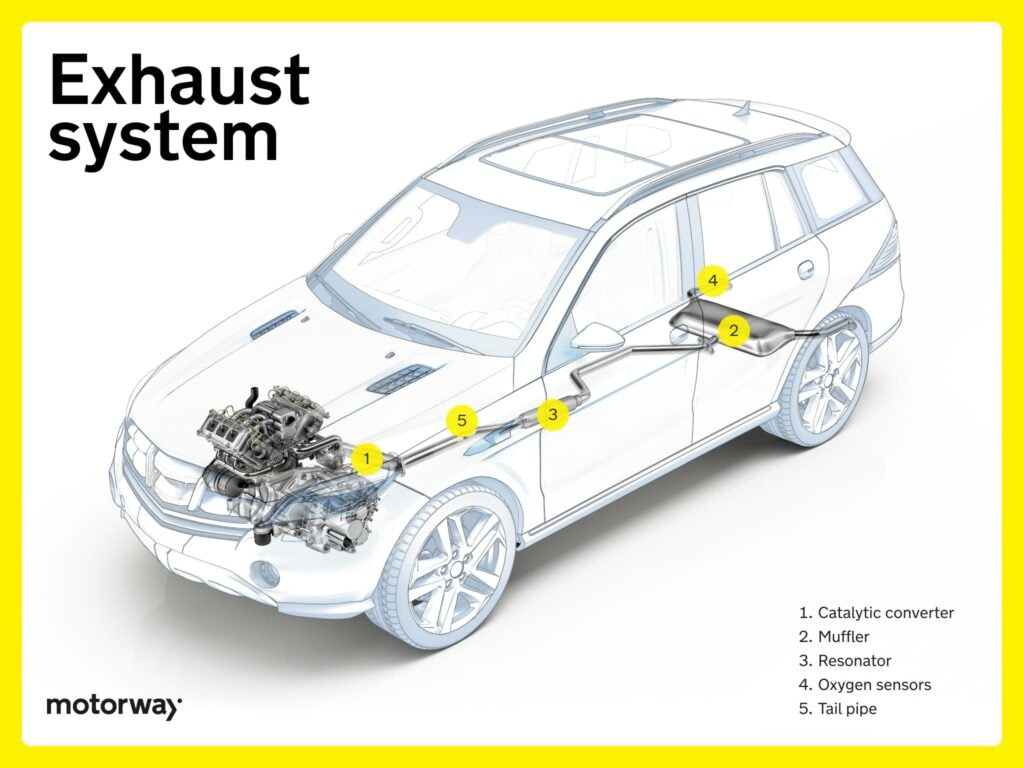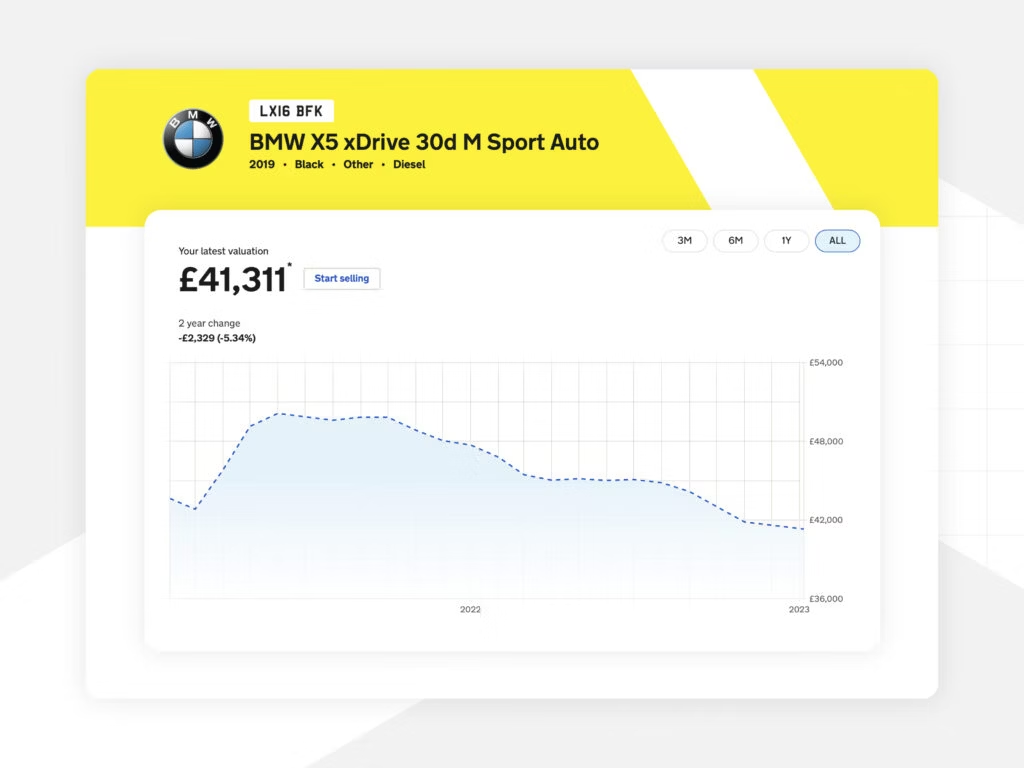How much does it cost to replace an exhaust system?
Replacing parts of your car’s exhaust system is a common maintenance task that’s crucial for optimal vehicle performance.
Your exhaust output is monitored every time you get your MOT, and its efficiency is directly tied to your running costs. If you live in a Clean Air Zone, you’ll also need to make sure that your vehicle is compliant with specific emissions standards to avoid additional charges. While compliance is tied to your engine rating, the number of pollutants emitted by your exhaust system is key.
For both the health of your car, the health of the environment, and to ensure you get the best possible price when you decide to sell your vehicle, it’s worth investing in your exhaust system. In the UK, repair and replacement exhaust costs typically range between £100 and £600, but depend on a variety of factors.
- Understanding your exhaust system
- Common exhaust pipe issues
- Signs it’s time for exhaust system replacement
- Repair and replacement costs
- FAQs
Understanding your exhaust system

Your car’s exhaust system plays a pivotal role in vehicle performance and environmental impact.
Made of components including the muffler, catalytic converter, and tail pipe, the exhaust system channels and filters the gases produced during combustion, ensuring they exit the engine safely. This system not only optimises engine efficiency, but helps reduce harmful emissions.
An efficient exhaust system contributes to a smoother-running vehicle, better fuel economy, and environmental responsibility, making it a crucial element in overall automotive health.

Exhaust pipe components
🚩 Exhaust manifold
The exhaust manifold collects all of the exhaust gases from your engine cylinders and channels them into a single pipe. The exhaust manifold streamlines the expulsion of gases from your vehicle to enhance engine performance.
Made of cast iron, stainless steel, or other durable materials, the manifold endures high temperatures and is therefore susceptible to heat-related damage.
🚩 Catalytic converter
The catalytic converter is a vital emissions control device, reducing the harmful pollutants in exhaust gases.
Positioned between the exhaust manifold and muffler, it helps convert pollutants like carbon monoxide and nitrogen oxides into less harmful substances. The catalytic converter is essential to maintaining your vehicle’s environmental standards and fulfilling MOT requirements.

🚩 Exhaust system midsection
Encompassing the pipes connecting the catalytic converter to the back box, the exhaust system’s midsection serves as a conduit for treated exhaust gases, ensuring a smooth flow toward the tailpipe.
🚩 Diesel particulate filter (DPF)
The DPF, integral in diesel vehicles, traps and reduces particulate matter emissions. Positioned in the exhaust, it captures soot particles, periodically initiating regeneration processes to burn accumulated soot.
This ensures compliance with emissions standards while enhancing fuel efficiency.
🚩 Back box or muffler
Situated at the rear end of the exhaust system, the back box, or muffler, plays a pivotal role in noise reduction. It utilises internal chambers to dissipate sound energy generated during the combustion process.
Different muffler designs cater to diverse sound preferences, striking a balance between maintaining acceptable noise levels and optimising engine performance.
🚩 Exhaust hangers, sensors, and flexible sections
Exhaust hangers provide support for the entire exhaust system, securing it to the vehicle’s chassis.
Sensors, such as oxygen sensors, monitor exhaust gas composition, aiding in fuel-air ratio adjustments for optimal combustion. Flexible sections such as bellows allow movement to reduce stress on the exhaust system.
Common exhaust pipe issues
While your exhaust system can be impacted by a variety of problems, below are some of the most common issues concerning exhaust pipes:
| Issue | Cause(s) | Symptoms |
| Exhaust leaks | Corrosion or damage to pipes | Hissing noises; increased engine noise |
| Catalytic converter failure | Overheating; engine misfires | Decreased performance; illuminated check engine light |
| Muffler issues | Rust; physical damage | Increased noise; rattling |
| Oxygen sensor malfunction | Sensor wear or failure | Poor fuel efficiency; illuminated check engine light |
Does a damaged exhaust system affect my car’s value?
Yes, a damaged exhaust system contributes to a steeper depreciation of your car, not to mention potential legal issues if you’re not in compliance with the latest emissions regulations.
When selling your car, a damaged exhaust system could signal neglect or potential underlying issues with the vehicle. How much this impacts your car’s value depends on the severity of the damage. Minor issues might have a smaller impact, especially if they’re repairable without significant cost, whereas major damage might significantly decrease the car’s value.
As always, providing a detailed history of repairs and maintenance, especially regarding the exhaust system, can mitigate some concerns potential buyers might have, which could help in maintaining the car’s value.
Signs it’s time for exhaust system replacement

🚩 Loud engine noise or abnormal sounds
Unusual engine noises, like rumbling, hissing, or roaring, are clear indicators of potential exhaust system issues.
These sounds often stem from a deteriorating muffler or exhaust pipe, causing disruptions to the normal operation of your vehicle. A failing muffler, for instance, can result in increased noise levels during acceleration or idling.
🚩 Decreased fuel efficiency
A noticeable decrease in fuel efficiency is a red flag for a compromised exhaust system.
Disruption to your exhaust system can contribute to an inefficient combustion process and decreased engine performance.
🚩 Visible damage
Visible wear and tear, such as rust, holes, or physical damage on the exhaust pipes, can be an indication of impending issues with your exhaust system.
Corrosion weakens the structural integrity of the exhaust components and can lead to leaks and reduced effectiveness. If you see any exhaust system damage, take action immediately.
🚩 Smell of fumes
The smell of exhaust fumes either within the cabin or outside your vehicle is a serious concern.
This indicates a compromised exhaust system, which allows harmful gases to escape the vehicle. Inhaling these fumes poses health risks, making immediate action imperative.
Repair and replacement costs
Location
Maintenance costs for exhaust repair and replacement vary by locale. For example, urban areas generally have higher service charges than rural locations. See below for our pricing guide, but always consult a mechanic for exact pricing on replacing parts in your vehicle.
| Location | Average cost range |
| London | £200 – £600 |
| Other cities and suburbs | £150 – £500 |
| Rural areas | £100 – £400 |
Car manufacturer and model
Like location, your car brand and make also play a role in overall exhaust system replacement costs as different vehicles have varying exhaust complexities. High-end or luxury cars often involve higher replacement costs when compared to standard models for a replacement exhaust.
We highlight average costs for some of the most popular vehicles on UK roads below:
| Vehicle manufacturer | Average cost range |
| Audi | £180 to £550 |
| BMW | £200 to £600 |
| Ford | £100 to£400 |
| Honda | £130 to £480 |
| Land Rover | £250 to £700 |
| Mercedes-Benz | £220 to £650 |
| Nissan | £110 to £520 |
| Toyota | £120 to £500 |
| Vauxhall | £90 to £430 |
| Volkswagen | £120 to £450 |
Exhaust system type
Standard exhaust systems are generally more affordable. Upgrading to a performance or custom exhaust system can escalate expenses, but provide additional features for your vehicle.
Damage extent
Minor repairs, such as patching holes or fixing leaks, are less costly. However, extensive damage requiring a full exhaust replacement can significantly increase overall costs.
Original Equipment Manufacturer vs. aftermarket parts
Opting for aftermarket exhaust components may offer cost savings during the exhaust system repair process. However, using Original Equipment Manufacturer (OEM) parts, while typically more expensive, ensure future quality and compatibility with your vehicle.
Labour costs
Skilled mechanics charge hourly rates for installation and exhaust repairs. The complexity of the exhaust leak and the expertise required can influence the overall exhaust cost significantly.
FAQs
Is it illegal to drive with a broken exhaust?
Yes, it’s illegal and unsafe to drive with a broken exhaust system. A damaged exhaust can emit harmful fumes, and you risk fines or penalties for non-compliance with emissions and safety regulations.
Is it worth it to replace the exhaust?
Yes, replacing a damaged exhaust with a new exhaust is worth it. Improved performance and fuel efficiency contribute to the long-term health of your vehicle, and compliance with emissions standards keep your vehicle on the road legally.
How much does it cost to replace a muffler?
Muffler replacement costs vary. On average, it can range from £90 to £430, depending on factors like the vehicle model, location, and the type of muffler chosen.
How can I track the value of my car?

A damaged exhaust system can greatly impact your vehicle’s valuation. But what if you don’t know what your car’s value is to begin with?
While it’s true that value depreciates over time, just how much that value changes varies from car to car. For a free and reliable monthly price alert on up to six vehicles at once, use Motorway’s Car Value Tracker.
With the Car Value Tracker, you can follow your vehicle worth as it changes over time and choose the best time to sell, and make informed choices about investments in your car’s maintenance.

Need to sell your car?
Want to learn more about owning, maintaining, and selling your car? Check out more of our guides here, covering everything from Clean Air Zones to car tax, and plate changes to part exchange.
- Sell my car
- Track your car value
- What are the most expensive parts of a car to replace?
- Car anatomy: what are the parts of a car?
- How much does it cost to replace a gearbox?
- How much does it cost to replace a car engine?
- How much does it cost to replace a car suspension?
- How much does it cost to replace brake pads?
- How much does it cost to replace a windscreen?
- How much does it cost to replace a head gasket?
- How much does it cost to replace a cambelt?
- How much does it cost to replace a car battery?
- How much does it cost to replace a car door?
- How much does it cost to replace a car radiator?
- How much does it cost to replace a clutch?
The information provided on this page is for general informational purposes only and should not be considered as professional advice.